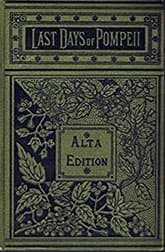The Last Days of Pompeii
Critique • Quotes • At the movies
 1851 Alta edition
1851 Alta editionFirst publication
1934
Literary form
Novel
Genres
Literary, historical fiction
Writing language
English
Author's country
England
Length
Approx. 158,500 words
Story gets in the way of ideas
It starts with an evening not at all dark or stormy, something like an ancient Greek dialogue actually—two friends meeting and discussing their dining plans. But already the signs of bad writing are evident.
And it's all downhill from there. Literally. As the melodrama unfolds among the residents of Pompeii, the mountain Vesuvius starts hissing and eventually rains volcanic ash onto all below.
No wonder The Last Days of Pompeii has often been made into films. It's an exciting, if rather inevitable, story involving young lovers, early Christians meeting in secret, an evil Egyptian pagan who imprisons and tries to rape our heroine, a conflicted pathetic blind girl, our hero being led to the lions as his friends plot his release.... And the retributive eruption.
The most entertaining part of the novel is probably the destruction of Pompeii. The falling ash destroys the city, killing thousands, creating something close to hell on earth for all the characters caught in it as they try to escape. It's an Armageddon dwarfing all the intrigues to that point with a display of power beyond the understanding of mere mortals.
Life and death
But the story is told so boringly.
The life is continually drained of potentially dramatic scenes by dull, didactic writing, enlivened periodically by bouts of overheated, purple prose. The author's historical research is extensive but it continually obtrudes, as he cannot help but keep pointing out details of artifacts or ancient customs when our interest should be most engaged by the life-and-death struggles.
On the positive side, Bulwer-Lytton's musings on religion and other matters are enjoyable when they were delivered without any pretense of a story. They're certainly more interesting than the predictable actions of the stiffly drawn characters or their stilted dialogue.
Beneath a conventional surface lies a depth of skepticism about Christianity, love and society, and a questioning wisdom in the author that is not so apparent in his shallow fiction. Or is that reaching too far, in desperation to find some saving graces in this novel often considered a classic?
Films: You may love it or hate the, but filmmakers have loved the book. The first adaptations were from the very earliest days of silent celluloid drama.
The versions you're most likely to catch are the 1935 Hollywood mess that shares little with the book besides the volcanic eruption, the 1960 Italian action-oriented film starring Steve (Hercules) Reeves, and the more credible 1984 mini-series for television.
— Eric
Critique • Quotes • At the movies

